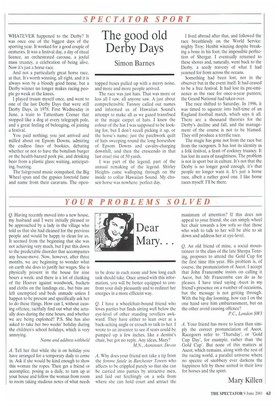Dear Mary.. .
Q. Having recently moved into a new house, my husband and I were initially pleased to be approached by a lady in the village who told us that she had cleaned for the previous people and would be happy to clean for us. It seemed from the beginning that she was not achieving very much, but I put this down to the predictable disorder that accompanies any house-move. Now, however, after three months, we are beginning to wonder what on earth she does to justify her wages. She is physically present in the house for nine hours a week, and there is a lot of clunking of the Hoover against woodwork, buckets and cloths on the landings etc., but bins are left unemptied and beds unmade unless I happen to be present and specifically ask her to do these things. How can I, without causing offence, tactfully find out what she actually does during the nine hours, and whether we are being exploited? P.S. She has also asked to take her two weeks' holiday during the children's school holidays, which is very annoying.
Name and address withheld A. Tell her that while she is on holiday you have arranged for a temporary daily to come in. Ask if she would be kind enough to show this woman the ropes. Then get a friend or accomplice, posing as a daily, to turn up at your house and follow the woman from room to room taking studious notes of what needs
to be done in each room and how long each task should take. Once armed with this information, you will be better equipped to confront your daily pleasantly and to redirect her energies in a more efficient way.
Q. I have a wheelchair-bound friend who loves parties but finds sitting well below the eye-level of other standing revellers awkward, They have either to lean over at a back-aching angle or crouch to talk to her. I wrote to an inventor to see if seats could be pumped up a few inches, like a dentist's chair, but got no reply. Any ideas, Mary?
MN, Axminster, Devon A. Why does your friend not take a tip from the femme fatale in Barchester Towers who affects to be crippled purely so that she can be carried into parties by attractive men, and laid out fetchingly on a sofa from where she can hold court and attract the
maximum of attention? If this does not appeal to your friend, she can simply wheel her chair towards a low sofa so that those who wish to talk to her will be able to sit down and address her at eye-level.
Q. An old friend of mine, a social mountaineer in the class of the late Sherpa Tenzing, proposes to attend the Gold Cup for the first time this year. His problem is, of course, the pronunciation of Ascot. I accept that John Francombe insists on calling it Ascot, but Mr Francombe can do as he pleases. I have tried saying Ascot in my friend's presence on a number of occasions, but the message is not getting through. With the big day looming, how can 1 on the one hand save him embarrassment, but on the other avoid causing offence?
P.C., London SW3 A. Your friend has more to learn than simply the correct pronunciation of Ascot. Racegoers refer to 'Thursday', or 'Gold Cup Day', for example, rather than 'the Gold Cup'. But none of this matters at Ascot, which remains, along with the rest of the racing world, a parallel universe where no spectre of snobbery ever darkens the happiness felt by those united in their love for horses and the sport.
Mary Killen


































































 Previous page
Previous page